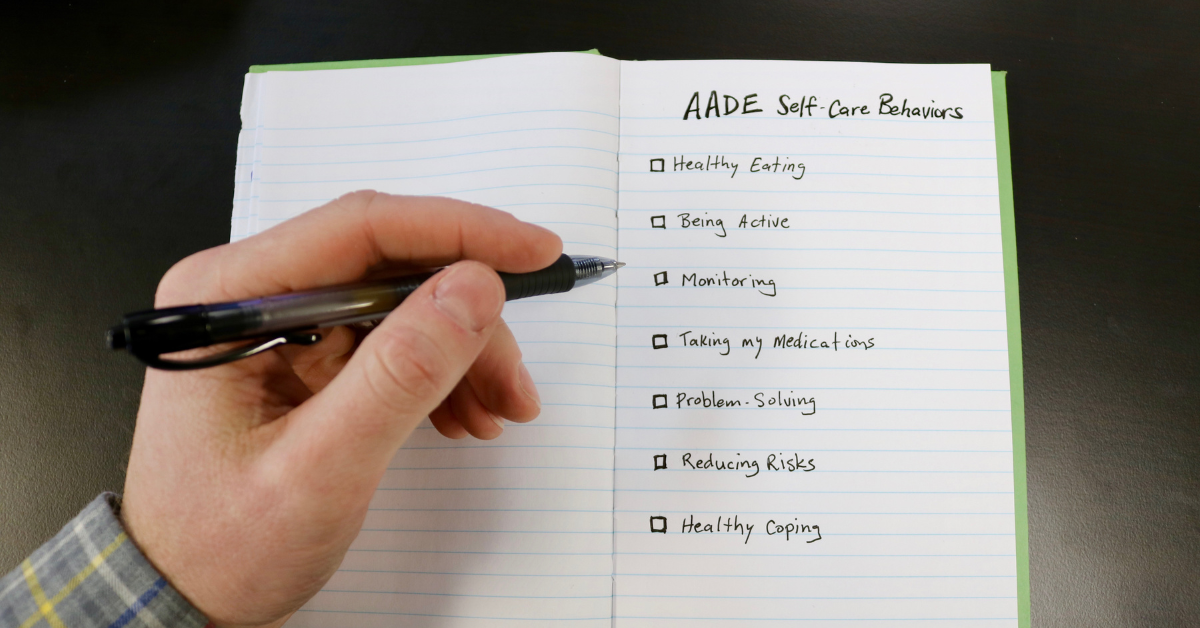
Dr. Bev discusses 7 areas of self-care focus from the AADE
Research has demonstrated that to achieve the best outcomes for people living with type 2 diabetes (T2D), you must actively participate in your own care. The American Association of Diabetes Educators (AADE) has defined 7 areas of focus for these self-care behaviors including healthy eating, being active, monitoring, taking medication, problem-solving, reducing risks, and healthy coping.
Here's why...
Just having diabetes can lead to some major health complications. Risks for heart disease, blindness, retinopathy, neuropathy, kidney disease, amputation, dental issues, and diabetes-related distress and depression all come with the territory. Although it sounds scary when laid out so plainly, these complications are not inevitable.
Individuals with diabetes have been shown to make a dramatic impact on the progression and development of their T2D by participating in their own care, thus reducing or averting any long-term complications. The greatest declines were for two leading causes of death: heart attack and stroke.
Tips to Prevent or Delay Complications
Here's where the AADE's advice can help. Let's look at the seven areas to focus on in your own self-care:
- Follow a healthy eating plan: Understanding how the foods you eat affect your blood glucose.
- Being active: Physical activity can help keep your blood glucose levels within your target range and help manage your diabetes.
- Monitoring: Checking your blood glucose levels regularly gives you vital information about your diabetes management. Monitoring helps you know when your blood glucose levels are on target and it helps you make food and activity adjustments.
- Taking medication: These include insulin, pills that lower your blood glucose, blood pressure medication, cholesterol-lowering medication, etc. which work together to lower your blood glucose levels and reduce your risk of complications and help you feel better.
- Problem-solving: There are some problem-solving skills that can help you prepare for the unexpected (such as, planning ahead and carrying a supply of fast-acting sugar if the need arises in the case of a hypoglycemic reaction).
- Reducing risks: You can take steps to lower your chance of diabetes-related complications (such as making and keeping appointments to see an ophthalmologist to check your eyes, appointments to see a podiatrist to check your feet, appointments to see a cardiologist to check your heart, etc.).
- Healthy coping: If you experience diabetes-related distress and/or depression, make an appointment to talk to a mental health practitioner who specializes in providing diabetes-focused therapy.
Additional Tips
- Manage your ABCs
A. Have your A1C checked to measure your average blood glucose over 2 to 3 months.
B. Try to keep your blood pressure normal (ideal is 120/80). Controlling your blood pressure reduces the risk of heart disease by as much as 50% and the risk of kidney, eye, and nerve disease by about 33%.
C. Control your cholesterol levels.
- Lose weight if you’re overweight: Just a 5% to 7% weight loss lowers the risk for complications.
- Stop smoking or don’t start.
Your “New Normal” Way of Life
Finding motivation for lifestyle changes while living with T2D can result in improved feelings of quality of life and reduce or avoid diabetes complications. Self-initiated behavior changes can promote better diabetes care and less diabetes-related distress. By accepting a new lifestyle attitude and actively participating in your own care, you can feel more motivated and empowered to manage your diabetes self-care.

